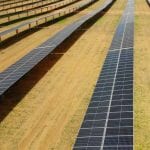Around The Web
CP Daily: Monday February 17, 2020
Government to take ‘technology over taxation’ approach to climate change
Morrison would not confirm reports of technology investment target but said emissions reductions are not achieved through ‘meetings’
Scott Morrison has described a report he may adopt a technology investment target to avoid signing up to a commitment of zero greenhouse gas emissions by 2050 as speculation, but confirmed his government will take a “technology over taxation” approach to climate change.
On Tuesday, Morrison told reporters in Melbourne the report in the Australian was “very speculative”, but said it was true that emissions reductions were achieved through technology, not “meetings”.
Continue reading...Victoria intervenes to try and solve wind and solar bottlenecks in local grid
 Victoria flags "go-it-alone" strategy on network upgrades, as it seeks to solve grid bottlenecks that is hurting and delaying large scale wind and solar projects.
Victoria flags "go-it-alone" strategy on network upgrades, as it seeks to solve grid bottlenecks that is hurting and delaying large scale wind and solar projects.
The post Victoria intervenes to try and solve wind and solar bottlenecks in local grid appeared first on RenewEconomy.
Australia has done little on emissions, and is not planning much in next decade
 Australia's emissions have risen substantially since 1990, and since 2005, without including land use, and its Paris goal are only reached through carry-over credits.
Australia's emissions have risen substantially since 1990, and since 2005, without including land use, and its Paris goal are only reached through carry-over credits.
The post Australia has done little on emissions, and is not planning much in next decade appeared first on RenewEconomy.
Queensland researchers smash solar efficiency record for ‘quantum dot’ solar cells
 UQ researchers smash efficiency record for 'quantum dot' solar cells, opening up the potential for flexible solar skins.
UQ researchers smash efficiency record for 'quantum dot' solar cells, opening up the potential for flexible solar skins.
The post Queensland researchers smash solar efficiency record for ‘quantum dot’ solar cells appeared first on RenewEconomy.
West Midlands canals to help heat hospitals in renewable energy drive
Government pledges to spend £20m turning canals, mines and rail lines into heat sources
The canals of the West Midlands may seem an unlikely source of warmth, but these waterways could soon be used to heat hospitals and tower blocks under a plan to harness Britain’s hidden heating sources.
The government has promised to spend more than £20m on nine schemes across the country to exploit cheap, renewable heat from canals, old mineshafts and in London tube lines.
Continue reading...Carbon Pulse kicks off 2020 with two new hires to enter investment, development phase
British radio antenna to arrive at space station
Queensland names two more sites for $2.5m EV network rollout
 Two additional sites identified for $2.5 million second phase of Queensland’s statewide public electric car charging network.
Two additional sites identified for $2.5 million second phase of Queensland’s statewide public electric car charging network.
The post Queensland names two more sites for $2.5m EV network rollout appeared first on RenewEconomy.
Sydney water restrictions to ease from 1 March following downpour
Drop from level 2 to level 1 restrictions announced after the ‘biggest rain event in 20 years’
Water restrictions will be relaxed across Sydney in a fortnight following the boost to dam levels from the “biggest rain event in 20 years”.
The change from level 2 to level 1 restrictions will take effect from 1 March when water quality in the catchment’s dams is expected to have improved.
Continue reading...New REDD standard expands to include subnational jurisdictions
Andrew Sabisky: No 10 adviser resigns over alleged race comments
Jeff Bezos: World's richest man pledges $10bn to fight climate change
West Midlands canals to help heat hospitals and homes under plans
Government pledges to spend £20m turning canals, mines and rail lines into heat sources
The canals of the West Midlands may seem an unlikely source of warmth, but these waterways could soon be used to heat hospitals and tower blocks under a plan to harness Britain’s hidden heating sources.
The government has promised to spend more than £20m on nine schemes across the country to exploit cheap, renewable heat from canals, old mineshafts and in London tube lines.
Continue reading...The Guardian view on flooded Britain: breaking the waves | Editorial
The mitigation measures promoted by ministers are important, but a new focus on climate and energy policies is needed
When Sue Marshall was evacuated from her home in Fishlake, near Doncaster, after the town was flooded in November, she told the Guardian: “What we need to know is that in two months’ time, the MPs will revisit this and look at what has been done to stop it happening again.” Barely three months have passed since rains described by experts as a once-in-60-years weather event. Yet parts of Britain are once again underwater.
Some of the worst-hit areas, such as Rotherham, were also badly affected in November. The latest heavy rains, brought by Storm Dennis, have also devastated parts of Wales, with a “major incident” declared at the weekend after more than a month’s rain fell in 48 hours, leading to landslides and people being trapped in their homes. Pontypridd town centre was underwater and surrounding villages were told by the Met Office they could be cut off for days. Hundreds of warnings remain in place, while thousands of homes have been flooded. At least three people have been killed in storm-related incidents, including a woman who disappeared after her car got stuck in water near Tenbury Wells in Worcestershire.
Continue reading...Coles says these toys promote healthy eating. I say that's rubbish
Extinction Rebellion digs up college's lawn in Cambridge – video
Climate protesters have dug up the lawn in front of Trinity’s 16th-century great gate, saying the Cambridge college must ‘cut ties with fossil fuel companies’.
A spokeswoman for Trinity said a statement would be released later, as the week-long series of demonstrations gets underway
Continue reading...LCFS Market: California prices retreat as hedging activity increases
A citizens’ assembly on climate is pointless if the government won’t listen | Stephen Buranyi
A similar set-up broke the political deadlock in Ireland, but the Tories don’t want to hear bold recommendations
When MPs announced a citizens’ assembly on the climate emergency last June, two crucial things hadn’t yet happened: Boris Johnson’s takeover of the Conservative party; and the subsequent general election campaign where the main opposition parties each offered radical plans to address the climate crisis, and then lost to Johnson, who had offered no plan at all.
For everyone hoping for action on climate, the election was a particularly bruising experience. First throwing open the door to a previously unthinkable possibility – immediate, concrete plans to fight the crisis, far beyond anything proposed by the inadequate Paris Agreement – and then, just as quickly, slamming that door shut. Perhaps even more tightly than before, given Johnson’s disinterest in all things climate-related. And because now the party without an apparent serious climate plan is in charge of taking the critical first steps towards Theresa May’s government’s goal of hitting net-zero by 2050, while the parties willing to commit to action are shut out of power by the enormous Tory majority.
Continue reading...Sifting through the ashes: Mallacoota residents after the bushfires – in pictures
Photographer and Mallacoota resident Rachel Mounsey documented the Australian bushfires that destroyed some 150 houses in her Victorian town and its surrounds. ‘When the New Year’s fire bore down on my town of Mallacoota I began to imagine the fire as a type of medieval dragon – heavy-footed and angry – coming towards us to destroy everything in its way,’ she says. Weeks after the catastrophe, Mounsey sits with neighbours who lost their homes, and asks: how do you move on mentally when all you own has turned to ash?
Continue reading...


